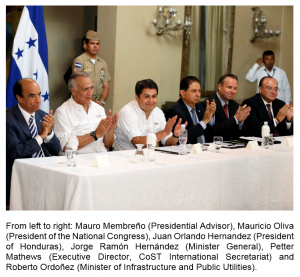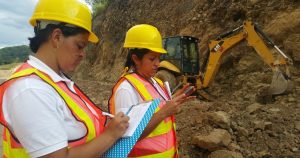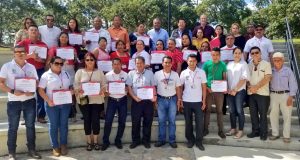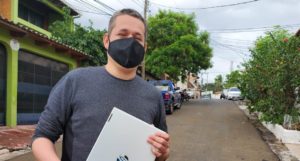Member from 2014 to 2024
Honduras joined CoST mid-year in 2014, and it was one of the most successful members, leading the implementation of CoST tools and standards in the Latin American region.
Prior to CoST: Public infrastructure in context
According to Transparency International’s annual Corruption Perceptions Index, in 2020, Honduras was ranked 157 out of 198 countries, with a score of 24 /100.

The main weaknesses in infrastructure governance in Honduras are related to a lack of trust in the legal framework and a lack of technological and human resources within procuring entities. There is also a lack of dialogue between the institutions that generate data and those using it.
In 2014, CoST conducted a Scoping Study in Honduras to gain insight into the public infrastructure sector. The Scoping Study assessed levels of data publication in line with the CoST Infrastructure Data Standard (CoST IDS), which requires the publication of 40 data points, or ‘items’, across the infrastructure project cycle. While 92% of these data points were available upon request, there were significant limitations to accessibility: only 67% were published on each procuring entity’s website, and only 27% were published on the country’s data portals.
As part of efforts to strengthen transparency, the Government of Honduras joined the Open Government Partnership (OGP) in 2011 and presented its first and second OGP National Action Plans in August 2012 and June 2014, respectively.
CoST Honduras: How it all began 
Multi-Stakeholder Working
Publication of data (disclosure)
Online portals: Empowering citizens through access to information
CoST Honduras leads the way with PPP
CoST Honduras became the first country to apply CoST data publication methods to public-private partnerships (PPPs) when it launched SISOCS PPP in conjunction with the World Bank and the Government in April 2018. Information published on high-value PPPs on SISOCS APP included the $139m Palmerola International Airport and a $1.1bn container and cargo terminal at Puerto Cortés. This marked a significant step toward establishing a culture of transparency in high-value PPP projects. As of September 2021, data on 21 infrastructure projects were on SISOCS PPP, representing a total amount of US$1.46 billion.
To catalyse greater impact in PPP infrastructure projects, the CoST International Secretariat has published the open-source code of SISOCS-APP in our CoST GitHub Repository, allowing it to be adapted and used by CoST members and others.
As mentioned, CoST Honduras has taken the initiative in data publication on PPP infrastructure projects, being the first CoST member to include PPPs in its assurance process in 2017. Later in 2019, its sixth assurance process focused exclusively on PPP projects, which collectively totaled US$277 million, revealing an average disclosure rate of 68.2% of the CoST IDS.
Institutionalising the CoST approach through executive decree
Independent review of data (assurance)

CoST Honduras undertook eight independent review processes, which evaluated around 100 public infrastructure projects in total, with the most recent reports published in December 2021.
The first three independent review processes identified key issues at the Honduras Road Fund, the government body responsible for maintaining Honduras’s road network. Recommendations from these independent reviews led to concrete actions by the Government of Honduras, which ultimately shut down the Road Fund for a lack of transparency and created a new, transparent body in its place.
Social accountability
Building capacity across society
School of Social Accountability

CoST Honduras created the School of Social Accountability to train members of Citizen Transparency Commissions, municipal commissioners, and other civil society organisations.
As of June 2021, 108 social auditors had been trained through the School, and 15 audits of local, publicly funded infrastructure works had been completed. At the request of the government, graduates of the School of Social Accountability collaborated with consultants to assess the levels of data publication and the quality of processes surrounding eight projects procured in the aftermath of Hurricanes Eta and Iota, which impacted Honduras and other countries in Central America in 2020. These projects were included in CoST Honduras’s 8th independent review process, which was published in 2022.
Transparency in Infrastructure Virtual Diploma
Engaging journalists for greater accountability

CoST Honduras developed two training programmes for journalists. The diploma in data journalism was designed to enhance journalists’ ability to analyse and utilise infrastructure information, and CoST Honduras trained 62 journalists and social communicators through this programme.
CoST Honduras also created the CoST Honduras Journalism Prize to encourage investigative research into public infrastructure in Honduras. The award recognised the three ‘best’ news articles related to infrastructure transparency and accountability published in national and other outlets. Alex Flores from El Mundo won first prize in 2020 for a two-part investigation that utilised information gleaned from a comprehensive review of 400 pages of contract data, exposing conflicts of interest in contracts awarded by the government investment body Invest-H for Covid-19 projects. Read our interview with Alex here.

International impact
CoST Tools
CoST Infrastructure Transparency Index
CoST Honduras Assurance Reports
First Assurance Report
Second Assurance Report
Third Assurance Report
Fourth Assurance Report
Fifth Assurance Report
Sixth Assurance Report